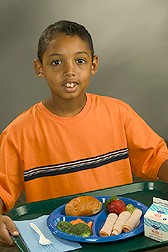
According to the Centers for Disease Control and Prevention, schools provide up to 50 percent of the daily caloric intake of school children. School meals are required to adhere to the Dietary Guidelines for Americans and have been shown to improve diet quality of children at risk for obesity. The Center is working to better understand school meal programs and their delivery on childhood outcomes including obesity, behavior, and academic achievement. One recent focus has been on the benefits of delivering breakfast after the school day begins (breakfast after the bell). Breakfast after the bell allows more children to participate in school breakfast but may also cut into instruction time. By studying Arkansas schools that adopted breakfast after the bell and those that served breakfast before the school day, we were able to show that breakfast can be incorporated into the rhythm of the school day without adversely impacting academic achievement. Moreover, we were able to develop compelling evidence that breakfast after the bell improves student behavior as measured by the number of disciplinary infractions reported. In partnership with local organizations like the Arkansas Hunger Relief Alliance, the Center is working to understand the economic impact of universal free meals both in terms of school nutrition budgets and childhood academic, behavioral, and health outcomes. Recent peer-reviewed studies on child nutrition programs include the following:
Cuadros-Meñaca A, Thomsen, MR and Nayga Jr. RM. School breakfast and student behavior. American journal of agricultural economics. Online ahead of print. DOI: 10.1111/ajae.12312
Cuadros-Menaca A, Thomsen MR, Nayga RM. Evaluation of delivering breakfast after the bell and academic performance among third-grade children: An application of the synthetic control method. Journal of school health. 2022. DOI: 10.1111/josh.13174
Cuadros-Meñaca A, Thomsen MR, Nayga RM. The effect of breakfast after the bell on student academic achievement. Economics of education review. 2022;86. DOI: 10.1016/j.econedurev.2021.102223
Schauder S, Thomsen MR, Nayga Jr RM. Agent-based modeling insights into the optimal distribution of the Fresh Fruit and Vegetable Program. Preventive medicine reports. 2020;20:101173-. DOI: 10.1016/j.pmedr.2020.101173, PMCID: PMC7475199.
